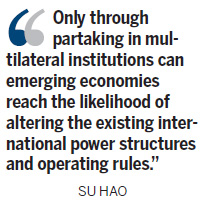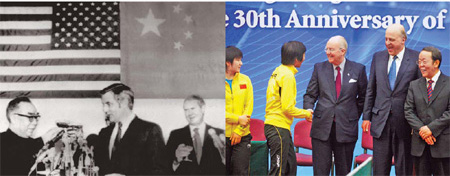Foreign Affairs
The multilateral path
By Wu Jiao (China Daily)
Updated: 2011-06-01 08:24
 |
Large Medium Small |

|
Left: China and US formally establish their diplomatic relations on Jan 1, 1979. Right: Senior US officials greet former Chinese table tennis world champion Qi Baoxiang at an event to mark Sino-US friendship in January 2009. Left: Xinhua ; Right: Yang Shizhong / China Daily |

China's foreign affairs in the first half of 2011 were characterized by several multilateral summits in which the country has played a prominent role. Among them are the recently concluded trilateral leadership summit involving China, Japan and the Republic of Korea in May, and the third summit of the BRICS (Brazil, Russia, India, China and South Africa) bloc and annual Boao Forum of Asia held in the resort Hainan province in April. These meetings yielded tangible results, with the leading emerging economies of the BRICS countries unifying their stance before the G20 meeting. Despite the fact these multilateral mechanisms have different viewpoints and different objectives, they, together with others that China has a stake in, are intended to enhance regional cooperation or counterbalance the clout of developed countries.
While the global media has in recent years painted China as an active player in many multilateral institutions, China's diplomatic landscape was very different several decades ago.
For 81-year-old Wang Yusheng, a veteran Chinese diplomat who served as ambassador to Colombia and head of the Chinese delegation to the Asia-Pacific Economic Cooperation (APEC), the change of China's foreign affairs strategy is more clearly outlined.
Wang says despite the fact the newly founded People's Republic of China took part in international meetings and befriended others during the 1950s and 1960s, the Cold War made the world clear cut and nipped the necessity of multilaterism.
During that time, China gave priority to relations with neighboring countries and Western powers on bilateral basis, reluctant to join regional organizations although it relished its status as a permanent member of the United Nations Security Council since 1971.
Only the end of the Cold War and changes to the world economic structure, marked by emerging economies having a bigger say, gave rise to multilateral institutions, says Wang.
Within China, the policy of reform and opening-up adopted in late 1970s not only brought a major change to the country's economic skyline, but to its diplomatic facets as well. China's interest in multilateral diplomacy and institutions grew correspondingly.
Around the beginning of 1990s, China began to take part in some regional mechanisms.
Wang, who from 1993 to 1998 served as a senior official for China in APEC, has first-hand experience of how China began its operation in multilateral mechanism.
"It's a huge transition from bilateral diplomacy to a multilateral one," says Wang.
Wang says China brought into APEC its principles, which were later accepted by other members and written into the code of the institution.
"When China joined APEC, some countries were still driven by Cold War mentality and sought supremacy in the institution. But China called for equal consultation and respect," he says.
The APEC approach, which emphasizes mutual respect, equality, mutual benefit and consensus, was adopted by members around 2000, absorbing much of the principles raised by China, Wang says.
Diplomats notice that China is very pragmatic in joining multilateral mechanisms, focusing on concrete cooperation on security, trade and economy.
Ma Zhengang, former Chinese ambassador to the United Kingdom, says the theme of China's multilateralism is cooperation, not only for China's benefit, but also for other members.
Ma says the change of the leadership's mindset in diplomatic strategy around the 1980s also contributed to accelerate China's participation in multilateral mechanism.
"The change from emphasizing 'reform and war' to 'peace and development' at the end of 1970s means that China has placed its priority on economic development, and its foreign policy was changed in due course to serve the priority," says Ma.
Su Hao, from China Foreign Affairs University, says that one reason driving China' gradual acceptance and later activism in multilateralism is that joining institutions has brought it benefits.
Another advantage is the strengthening of ties with the larger powers in the 1990s during a time when Western powers were keeping their distance from a developing socialist country, says Su.
For instance, through APEC, China got the opportunity to communicate with the US. And a crucial element in the success of ASEAN plus Three is that China used it to try to mend relations with Japan.
Membership also enabled China to solve the problem of Taiwan illegitimately struggling for the identity of an independent country on the world stage, says Su.
Another advantage is that it helps manifest China's commitment to cooperation, says Su. For instance, China used its participation in APEC, in conjunction with its entry to the WTO in 2001, to signal its commitment to open markets and free trade; and the APEC summit in Shanghai in 2000 was a lavish coming-out party for the Chinese economy.
As well, China co-founded regional organizations, including the Shanghai Cooperation Organization (SCO) and BRICS. SCO is an intergovernmental security organization founded in 2001 in Shanghai by China, Kazakhstan, Kyrgyzstan, Russia, Tajikistan and Uzbekistan. It has now expanded from security to economic and political sectors.
Zhang Deguang, former Chinese ambassador to Russia who was the first secretary-general of SCO, says China's active participation in world institutions is mainly because it is in line with its diplomatic strategy.
International institutions are conducive to building a stable global order, which is in line with the strategic demands of China to maintain a peaceful external environment for its development, Zhang says.
In the G20 club, for example, China plays a more visible role by pushing for global financial reform. And in climate change talks, China stands with other developing economies to seek equal yet differentiated responsibility.
Analysts also note that another positive signal is China's willingness to join multilateral military activities, including those led by the US and its allies. The PLA has sent observers to an exercise known as Cobra Gold in Thailand, has held bilateral exercises and has invited countries to observe its own exercises.
Analysts foresee that China will continue its momentum of active participation in multilateral mechanisms.
"Only through partaking in multilateral institutions can emerging economies reach the likelihood of altering the existing international power structures and operating rules," Su says.
(China Daily 06/01/2011 page44)
| 分享按钮 |
